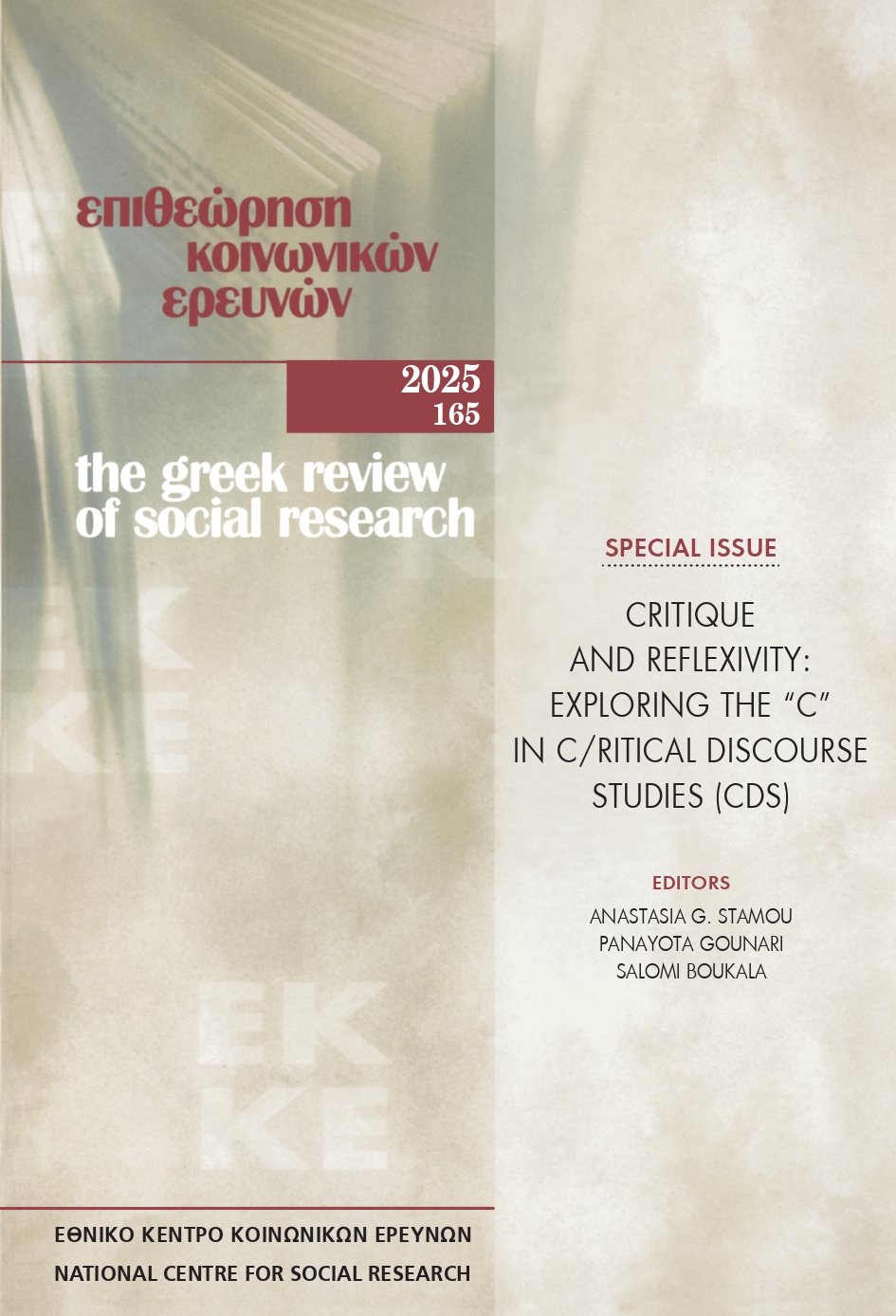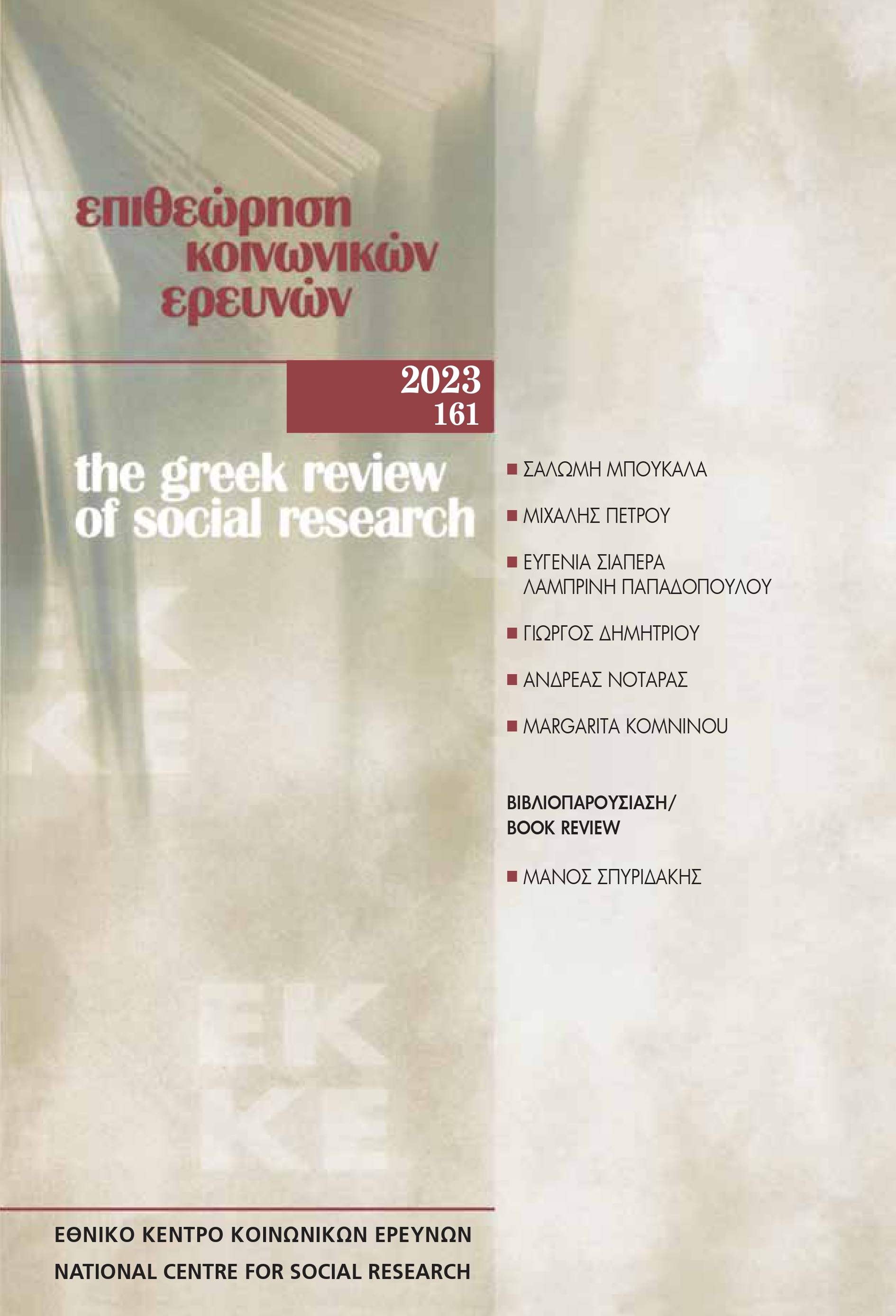Κριτική και αναστοχαστικότητα: Διερευνώντας το «Κ» στις Κριτικές Σπουδές Λόγου (ΚΣΛ) Εισαγωγή: Η οπτική των επιμελητριών
Περίληψη
Οι Κριτικές Σπουδές Λόγου (ΚΣΛ) διακρίνονται από τις «μη-κριτικές» προσεγγίσεις, καθώς δεν περιορίζονται στην περιγραφή του ρόλου της γλώσσας στην κοινωνία, αλλά επιδιώκουν να εξηγήσουν πώς και γιατί η γλώσσα συνδέεται με την ιδεολογία και με σχέσεις εξουσίας. Ωστόσο, η έννοια της «κριτικής» παραμένει συχνά ασαφής. Το παρόν Ειδικό Τεύχος εξετάζει αυτές τις ασάφειες, εστιάζοντας στην ιδεολογία, την εξουσία, την κριτική και την αναστοχαστικότητα. Με άρθρα κυρίως από Έλληνες ερευνητές και Ελληνίδες ερευνήτριες, επιδιώκει την ενίσχυση ενός αναστοχαστικού διακειμενικού διαλόγου και την προώθηση της ακαδημαϊκής αναγνώρισης και θεσμικής παρουσίας των ΚΣΛ στην Ελλάδα, ενώ παράλληλα θέτει ευρύτερα ερωτήματα σχετικά με τη μεταβαλλόμενη σημασία και τον ρόλο τους στην κριτική επιστημονική σκέψη.
Λεπτομέρειες άρθρου
- Πώς να δημιουργήσετε Αναφορές
-
Stamou, A. G., Gounari, P., & Boukala, S. (2025). Κριτική και αναστοχαστικότητα: Διερευνώντας το «Κ» στις Κριτικές Σπουδές Λόγου (ΚΣΛ) Εισαγωγή: Η οπτική των επιμελητριών. Επιθεώρηση Κοινωνικών Ερευνών, 165, 3–26. https://doi.org/10.12681/grsr.42197
- Ενότητα
- Άρθρα

Αυτή η εργασία είναι αδειοδοτημένη υπό το CC Αναφορά Δημιουργού – Μη Εμπορική Χρήση 4.0.
Οι συγγραφείς των άρθρων που δημοσιεύονται στην Επιθεώρηση Κοινωνικών Ερευνών διατηρούν τα δικαιώματα πνευματικής ιδιοκτησίας επί των άρθρων τους, δίνοντας στο περιοδικό το δικαίωμα της πρώτης δημοσίευσης. Άρθρα που δημοσιεύονται στην Επιθεώρηση Κοινωνικών Ερευνών διατίθενται με άδεια Creative Commons 4.0 και σύμφωνα με την άδεια μπορούν να χρησιμοποιούνται ελεύθερα, με αναφορά στο/στη συγγραφέα και στην πρώτη δημοσίευση για μη κερδοσκοπικούς σκοπούς.
Το Εθνικό Κέντρο Κοινωνικών Ερευνών διατηρεί το δικαίωμα να δημοσιεύει, να αναπαραγάγει, να παρουσιάζει στο κοινό, να διανέμει και χρησιμοποιεί άρθρα που δημοσιεύονται στην Επιθεώρηση Κοινωνικών Ερευνών σε οποιοδήποτε μέσο και μορφή είτε μεμονωμένα είτε ως μέρη συλλογικών έργων, για όλο τον χρόνο διάρκειας προστασίας της πνευματικής ιδιοκτησίας και για όλες τις χώρες του κόσμου. Αυτό περιλαμβάνει ενδεικτικά και όχι αποκλειστικά το δικαίωμα δημοσίευσης των άρθρων σε τεύχη της Επιθεώρησης Κοινωνικών Ερευνών, αναπαραγωγής και διανομής μεμονωμένων αντιγράφων των άρθρων, αναπαραγωγής ολόκληρων των άρθρων σε άλλη έκδοση του Εθνικού Κέντρου Κοινωνικών Ερευνών, καθώς και αναπαραγωγής και διανομής των άρθρων ή περίληψης αυτών με χρήση πληροφορικού συστήματος αποθετηρίου.




